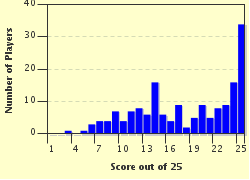Quiz Answer Key and Fun Facts
1. The letter 'A'. What wicked queen killed her grandchildren to cement her hold on power? (2 Kings 11)
2. The letter 'B'. What king is forever linked with the common phrase 'see the handwriting on the wall'? (Daniel 5)
3. The letter 'C'. What was the name of the Persian king who granted permission to the Israelites to return to Jerusalem to rebuild the temple of God?
4. The letter 'D'. After committing adultery and murder, who was the king who was rebuked by Nathan the prophet?
5. The letter 'E'. Scripture tells of Ehud, a left-handed Benjamite, killing the "very fat" king of Moab. What's the name of the king, as per Judges 3:15?
6. The letter 'F'. Fifteen years were added to a king's life by the LORD, according to 2 Kings 20:1-6. What was his name?
7. The letter 'G'. Genesis 14:1-2 tells of Chedorlaomer and his allies attacking districts controlled by various kings, including the king of Gomorrah. What's the name of the king of Gomorrah?
8. The letter 'H'. Which New Testament king was struck down by an angel of the Lord because he did not give praise to God? (Acts 12:21-23)
9. The letter 'I'. Who was the second king of Israel, replacing his father Saul, before David officially became king?
10. The letter 'J'. Who was the king of Judah who, according to Scripture, was pious and was the son of Asa? (He was succeeded by his son Jehoram, as per 1 Kings 22:50.)
11. The letter 'K'. Who was the father of Saul, the first king of Israel?
12. The letter 'L'. Proverbs 31 is written by a king who says he is sharing wisdom taught to him by his mother. What is the king's name?
13. The letter 'M'. Who was the son of Hezekiah and became king of Judah at the age of 12 years, reigning for 55 turbulent years?
14. The letter 'N'. Who ordered Shadrach, Meshach and Abednego to be thrown into a fiery furnace?
15. The letter 'O'. Out of the names below, which one was a king of Israel and reigned wickedly, as per the 16th chapter of 1 Kings?
16. The letter 'P'. Hoshea was the last king of the northern ten tribes of Israel and he assumed the throne after killing his predecessor, as per 2 Kings 15:27-31. Who was his predecessor? (His predecessor had replaced another king with a 'P' name -- Pekahiah.)
17. The letter 'Q'. Who was the queen who traveled to Jerusalem to meet with King Solomon, as per 1 Kings 10:1?
18. The letter 'R'. Who replaced his father Solomon as king?
19. The letter 'S'. What king, according to a prophet of God, was supposed to have been named Jedidiah?
20. The letter 'T'. There is only one Egyptian queen who is named in Scripture. Who is she?
21. The letter 'U'. According to 2 Chronicles 26:21, a king had leprosy until the day he died and he was banned from the temple of the LORD. Jotham, his son, had charge of the palace and governed the people of the land. What was the king's name?
22. The letter 'V'. According to the first chapter of Esther, what was the name of the queen who was deposed by the king known as Ahasuerus in the NKJV Bible?
23. The letter 'W'. There is no king or queen in the Hebrew Bible, or the Old Testament of the English Bible, who has a name that starts with 'W'.
24. The letters 'X' and 'Y'. In the KJV Bible, as well as other versions, the king of Persia in the Book of Esther is identified as Ahasuerus. What's the king's name in the NIV?
25. The letter 'Z'. Who was the last king of Judah?
Source: Author
Cowrofl
This quiz was reviewed by FunTrivia editor
CellarDoor before going online.
Any errors found in FunTrivia content are routinely corrected through our feedback system.

